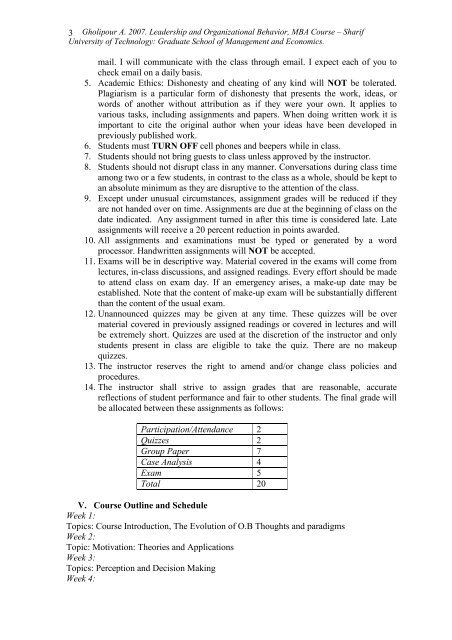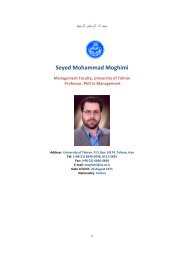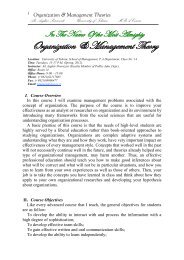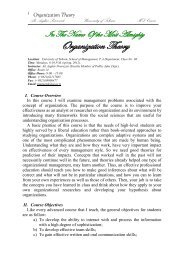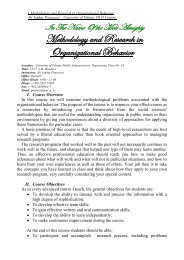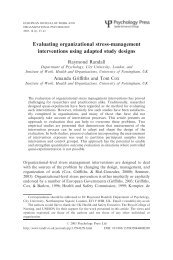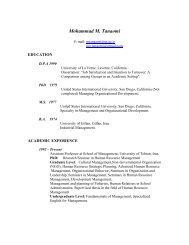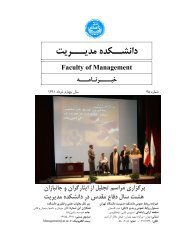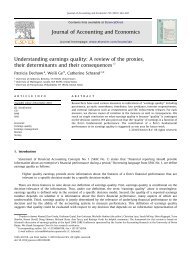Leadership and Organizational Behavior
Leadership and Organizational Behavior
Leadership and Organizational Behavior
Create successful ePaper yourself
Turn your PDF publications into a flip-book with our unique Google optimized e-Paper software.
3 Gholipour A. 2007. <strong>Leadership</strong> <strong>and</strong> <strong>Organizational</strong> <strong>Behavior</strong>, MBA Course – Sharif<br />
University of Technology: Graduate School of Management <strong>and</strong> Economics.<br />
mail. I will communicate with the class through email. I expect each of you to<br />
check email on a daily basis.<br />
5. Academic Ethics: Dishonesty <strong>and</strong> cheating of any kind will NOT be tolerated.<br />
Plagiarism is a particular form of dishonesty that presents the work, ideas, or<br />
words of another without attribution as if they were your own. It applies to<br />
various tasks, including assignments <strong>and</strong> papers. When doing written work it is<br />
important to cite the original author when your ideas have been developed in<br />
previously published work.<br />
6. Students must TURN OFF cell phones <strong>and</strong> beepers while in class.<br />
7. Students should not bring guests to class unless approved by the instructor.<br />
8. Students should not disrupt class in any manner. Conversations during class time<br />
among two or a few students, in contrast to the class as a whole, should be kept to<br />
an absolute minimum as they are disruptive to the attention of the class.<br />
9. Except under unusual circumstances, assignment grades will be reduced if they<br />
are not h<strong>and</strong>ed over on time. Assignments are due at the beginning of class on the<br />
date indicated. Any assignment turned in after this time is considered late. Late<br />
assignments will receive a 20 percent reduction in points awarded.<br />
10. All assignments <strong>and</strong> examinations must be typed or generated by a word<br />
processor. H<strong>and</strong>written assignments will NOT be accepted.<br />
11. Exams will be in descriptive way. Material covered in the exams will come from<br />
lectures, in-class discussions, <strong>and</strong> assigned readings. Every effort should be made<br />
to attend class on exam day. If an emergency arises, a make-up date may be<br />
established. Note that the content of make-up exam will be substantially different<br />
than the content of the usual exam.<br />
12. Unannounced quizzes may be given at any time. These quizzes will be over<br />
material covered in previously assigned readings or covered in lectures <strong>and</strong> will<br />
be extremely short. Quizzes are used at the discretion of the instructor <strong>and</strong> only<br />
students present in class are eligible to take the quiz. There are no makeup<br />
quizzes.<br />
13. The instructor reserves the right to amend <strong>and</strong>/or change class policies <strong>and</strong><br />
procedures.<br />
14. The instructor shall strive to assign grades that are reasonable, accurate<br />
reflections of student performance <strong>and</strong> fair to other students. The final grade will<br />
be allocated between these assignments as follows:<br />
Participation/Attendance 2<br />
Quizzes 2<br />
Group Paper 7<br />
Case Analysis 4<br />
Exam 5<br />
Total 20<br />
V. Course Outline <strong>and</strong> Schedule<br />
Week 1:<br />
Topics: Course Introduction, The Evolution of O.B Thoughts <strong>and</strong> paradigms<br />
Week 2:<br />
Topic: Motivation: Theories <strong>and</strong> Applications<br />
Week 3:<br />
Topics: Perception <strong>and</strong> Decision Making<br />
Week 4:


